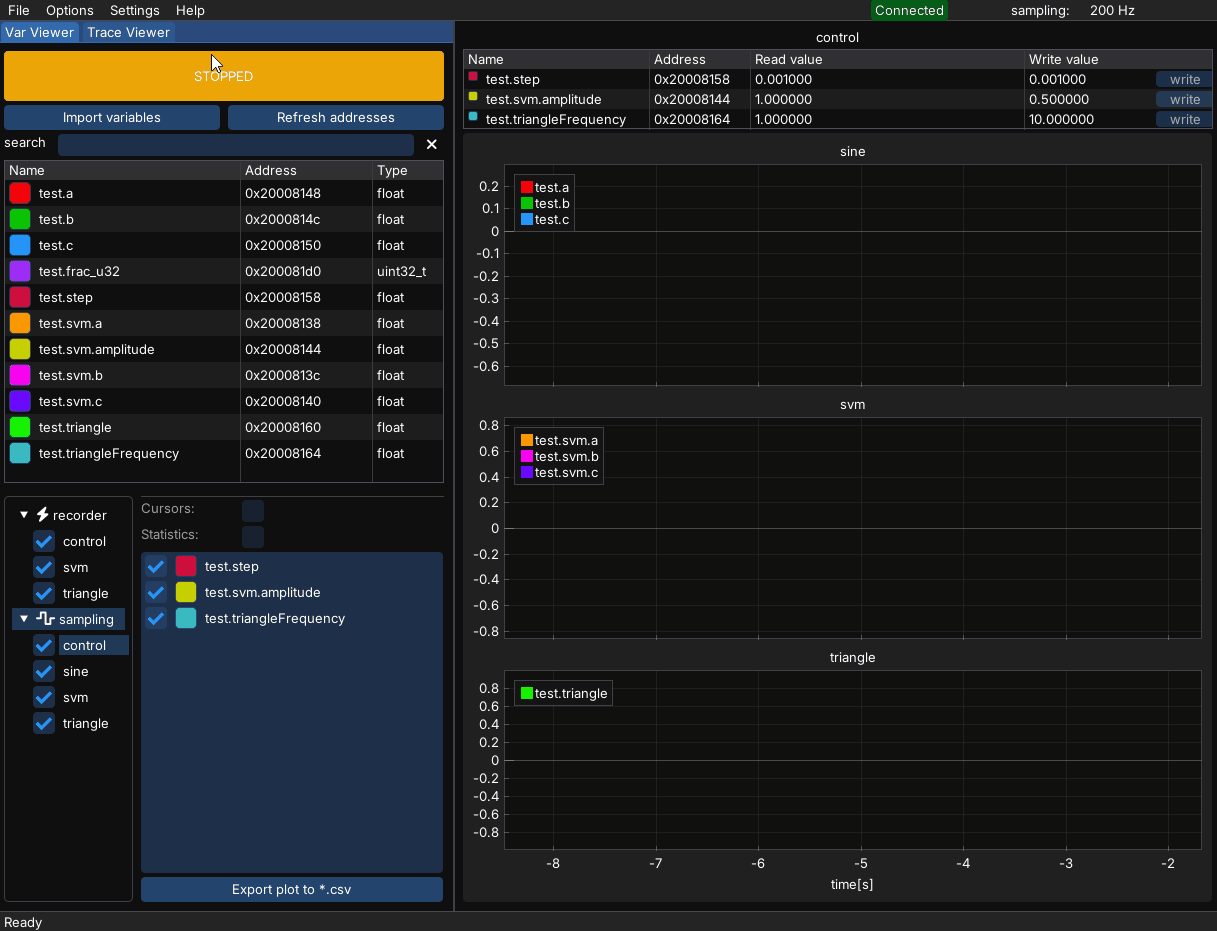Introduction#
MCUViewer is a non-intrusive GUI debugging tool for microcontrollers that allows quick visualization of variable values in real-time.

Downloads#
MCUViewer can be downloaded from the MCUViewer website.
Installation#
Windows#
On Windows MCUViewer can be either installed or unpacked (portable version). Unpacking might be preferable in some cases as it does not require admin rights.
Installing - download the *.zip file, unpack it, and double click the installer. Follow the instructions.
Unpacking - download the *.zip file, unpack it, and unpack the *.exe installer once again. Copy the unpacked folders to a preferred location. Run by double clicking the
MCUViewer.exefile from bin directory.
Note
Minimum supported version is Windows 10.
Linux#
Download the *.deb package and install it using:
sudo apt install ./MCUViewer-x.y.z-Linux.deb
On Linux MCUViewer requires a valid gdb. Please install it if not already present. You can check if it works by typing gdb --version in your terminal window.
Note
Minimum supported version is Ubuntu 22.04 LTS.
MacOS#
Download the *.dmg package. Open it and drag and drop the MCUViewer app to Applications folder. If you’re on ARM, you’ll be propmted to install Rosetta when running the app. If the application does not run due to unverified source, make sure to allow it in the security preferences (Privacy & Security -> Security -> “Open Anyway”).
Note
Minimum supported version is MacOS 12 (Monterey).
Quick Start - Variable Viewer#

The Variable Viewer module samples the addresses of selected variables at regular time intervals. It is generally well-suited for medium-frequency signals, as the sampling rate is limited by the SWD speed and the type of probe used. If high-speed readout is required, please refer to the Recorder section or try the SWO-based Trace Viewer.
Your target should be connected to the debug probe using SWDIO, SWCLK, and GND pins.
Select the
*.elffile of your project inOptions->Acquisition.Choose the debug probe.
Close the
Options->Acquisitionwindow and click theImport Variablesbutton.Select the variables you want to visualize and click
Import.Drag and drop the selected variables onto the plot canvas.
Click the large
STOPPEDbutton to start data acquisition.
In case of any errors make sure to visit Variable Viewer and FAQ
Quick Start - Trace Viewer#

The Trace Viewer module parses SWO trace data and displays the results in the form of plots. It enables visualization of high-speed signals with minimal overhead, as well as digital plots for visualizing and profiling interrupt execution.
Your target should be connected to the debug probe using the SWDIO, SWCLK, SWO, and GND pins.
Switch to the
Trace Viewertab.Select the debug probe in
Options → Acquisition, then close the window.Enter your core frequency in kHz in the main window.
Select a trace prescaler - start with a relatively high value (e.g., ~20), as this depends heavily on your debug probe and SWD setup.
In your code, place special markers:
Example for digital data:
ITM->PORT[x].u8 = 0xaa; //enter tag 0xaa - plot state high
foo();
ITM->PORT[x].u8 = 0xbb; //exit tag 0xbb - plot state low
And for tracing “analog” signals you can use:
float a = sin(10.0f * i); // some high frequency signal to trace
ITM->PORT[x].u32 = *(uint32_t*)&a; // type-punn to desired size: sizeof(float) = sizeof(uint32_t)
or
uint16_t a = getAdcSample(); // some high frequency signal to trace
ITM->PORT[x].u16 = a;
where x is the channel number in MCUViewer. Moreover you need to configure the SWO pin of your microcontroller.
Click the large
STOPPEDbutton to begin acquisition
In case of any errors please visit Trace Viewer and FAQ
License#
MCUViewer is distributed under the EULA License. The license is available online and after installation in:
Windows:
C:\Program Files\MCUViewer\binLinux:
/usr/local/MCUViewerMacOS:
Applications/MCUViewer/Contents/Resources
Note
MCUViewer may not support all microcontroller targets supported by STMicroelectronics’ ST-Link tools when using the STLink debug probe. Users are responsible for verifying compatibility with their target device before purchase or deployment.
For questions regarding licensing, contact contact@mcuviewer.com.
Reporting bugs or improvements#
To report an issue or a feature request please contact us at contact@mcuviewer.com or start a new issue on the MCUViewer GitHub repository.
In case of a bug, please provide the following information to make it easier to reproduce and fix:
MCUViewer version
Operating system and version
Debug probe and target type
Log file (log directory can be found in
Settings->Generalwindow)Steps to reproduce, screenshots or videos of the issue
